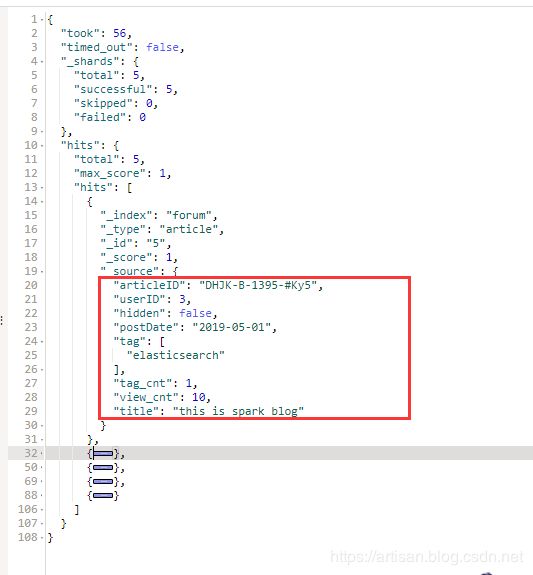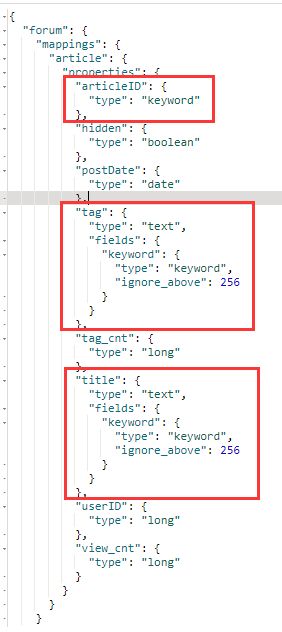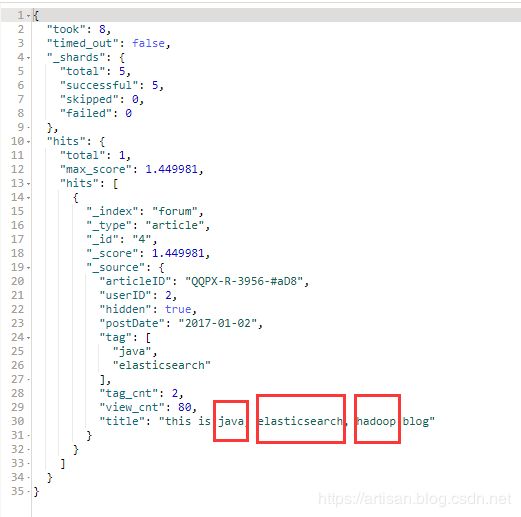白话Elasticsearch06- 深度探秘搜索技术之手动控制全文检索结果的精准度
文章目录
- 概述
- 数据
- 小例子
- 搜索标题中包含java或elasticsearch的blog
- 搜索标题中包含java和elasticsearch的blog
- 搜索包含java,elasticsearch,spark,hadoop,4个关键字中,至少3个的blog
- 用bool组合多个搜索条件,来搜索title
- bool组合多个搜索条件,如何计算relevance score
- 搜索java,hadoop,spark,elasticsearch,至少包含其中3个关键字
概述
继续跟中华石杉老师学习ES,第六篇
课程地址: https://www.roncoo.com/view/55
如果我们要想对全文检索的方式实现更细粒度的控制该怎么办呢? 这里我们就来探讨下手动控制全文检索结果的精准度的几种方式
match query
6.4版本 :
https://www.elastic.co/guide/en/elasticsearch/reference/6.4/query-dsl-match-query.html
7.0
https://www.elastic.co/guide/en/elasticsearch/reference/7.0/query-dsl-match-query.html
数据
为了说明该部分,我们给帖子数据增加标题title字段
POST /forum/article/_bulk
{"update":{"_id":"1"}}
{"doc":{"title":"this is java and elasticsearch blog"}}
{"update":{"_id":"2"}}
{"doc":{"title":"this is java blog"}}
{"update":{"_id":"3"}}
{"doc":{"title":"this is elasticsearch blog"}}
{"update":{"_id":"4"}}
{"doc":{"title":"this is java, elasticsearch, hadoop blog"}}
{"update":{"_id":"5"}}
{"doc":{"title":"this is spark blog"}}
mapping :
小例子
搜索标题中包含java或elasticsearch的blog
重点是: 或
The match query is of type boolean. It means that the text provided is analyzed and the analysis process constructs a boolean query from the provided text
这个,就跟之前的那个term query,不一样了。不是搜索exact value,是进行full text全文检索。
match query,是负责进行全文检索的。当然,如果要检索的field,是 not_analyzed类型的,或者是keyword类型,那么match query也相当于term query。
title的字段映射为
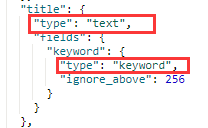
我们先看下 “this is java and elasticsearch blog” 的分词
GET /forum/_analyze
{
"field": "title",
"text": "this is java and elasticsearch blog"
}
被拆分成了 this 、 is 、java 、 and 、 elasticsearch 、 blog 存放在倒排索引中
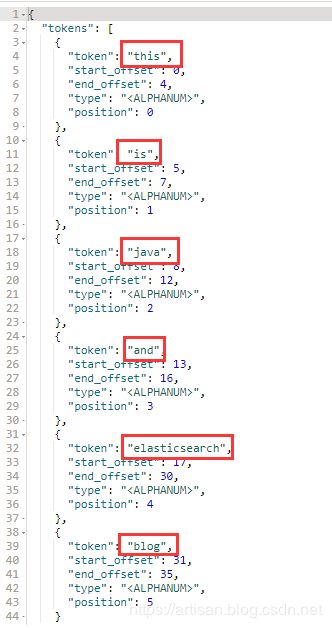
我们要 搜索标题中包含java或elasticsearch的blog ,改如何做呢?
看看 java elasticsearch 的分词
GET /forum/_analyze
{
"field": "title",
"text": "java elasticsearch"
}
所以,这个只要match query即可
GET /forum/_search
{
"query": {
"match": {
"title": "java elasticsearch"
}
}
}
返回4条数据 ,符合 或
{
"took": 5,
"timed_out": false,
"_shards": {
"total": 5,
"successful": 5,
"skipped": 0,
"failed": 0
},
"hits": {
"total": 4,
"max_score": 0.8092568,
"hits": [
{
"_index": "forum",
"_type": "article",
"_id": "4",
"_score": 0.8092568,
"_source": {
"articleID": "QQPX-R-3956-#aD8",
"userID": 2,
"hidden": true,
"postDate": "2017-01-02",
"tag": [
"java",
"elasticsearch"
],
"tag_cnt": 2,
"view_cnt": 80,
"title": "this is java, elasticsearch, hadoop blog"
}
},
{
"_index": "forum",
"_type": "article",
"_id": "1",
"_score": 0.5753642,
"_source": {
"articleID": "XHDK-A-1293-#fJ3",
"userID": 1,
"hidden": false,
"postDate": "2017-01-01",
"tag": [
"java",
"hadoop"
],
"tag_cnt": 2,
"view_cnt": 30,
"title": "this is java and elasticsearch blog"
}
},
{
"_index": "forum",
"_type": "article",
"_id": "3",
"_score": 0.2876821,
"_source": {
"articleID": "JODL-X-1937-#pV7",
"userID": 2,
"hidden": false,
"postDate": "2017-01-01",
"tag": [
"hadoop"
],
"tag_cnt": 1,
"view_cnt": 100,
"title": "this is elasticsearch blog"
}
},
{
"_index": "forum",
"_type": "article",
"_id": "2",
"_score": 0.19856805,
"_source": {
"articleID": "KDKE-B-9947-#kL5",
"userID": 1,
"hidden": false,
"postDate": "2017-01-02",
"tag": [
"java"
],
"tag_cnt": 1,
"view_cnt": 50,
"title": "this is java blog"
}
}
]
}
}
搜索标题中包含java和elasticsearch的blog
重点是: 和
The operator flag can be set to or or and to control the boolean clauses (defaults to or).
如果你希望所有的搜索关键字都要匹配的,那么就用and,可以实现单纯match query无法实现的效果
GET /forum/_search
{
"query": {
"match": {
"title": {
"query": "java elasticsearch",
"operator": "and"
}
}
}
}
返回2条数据 ,OK
搜索包含java,elasticsearch,spark,hadoop,4个关键字中,至少3个的blog
指定一些关键字中,必须至少匹配其中的多少个关键字,才能作为结果返回
The minimum number of optional should clauses to match can be set using the minimum_should_match parameter.
minimum_should_match 说明
https://www.elastic.co/guide/en/elasticsearch/reference/7.0/query-dsl-minimum-should-match.html
百分比
GET /forum/_search
{
"query": {
"match": {
"title": {
"query": "java elasticsearch spark hadoop",
"minimum_should_match": "75%"
}
}
}
}
数字
GET /forum/_search
{
"query": {
"match": {
"title": {
"query": "java elasticsearch spark hadoop",
"minimum_should_match": 3
}
}
}
}
返回一条数据 ,符合了至少3个
用bool组合多个搜索条件,来搜索title
GET /forum/article/_search
{
"query": {
"bool": {
"must": {
"match": {
"title": "java"
}
},
"must_not": {
"match": {
"title": "spark"
}
},
"should": [
{
"match": {
"title": "hadoop"
}
},
{
"match": {
"title": "elasticsearch"
}
}
]
}
}
}
match在匹配时会对所查找的关键词进行分词,然后按分词匹配查找.
term会直接对关键词进行查找。一般模糊查找的时候,多用match,而精确查找时可以使用term.
也可以使用term精确查找
GET /forum/_search
{
"query": {
"bool": {
"must": {
"term": {
"title": "java"
}
},
"must_not": {
"term": {
"title": "spark"
}
},
"should": [
{
"term": {
"title": "hadoop"
}
},
{
"term": {
"title": "elasticsearch"
}
}
]
}
}
}
bool组合多个搜索条件,如何计算relevance score
must和should搜索对应的分数,加起来,除以must和should的总数
- 排名第一:java,同时包含should中所有的关键字,hadoop,elasticsearch
- 排名第二:java,同时包含should中的elasticsearch
- 排名第三:java,不包含should中的任何关键字
should是可以影响相关度分数的
must是确保说,谁必须有这个关键字,同时会根据这个must的条件去计算出document对这个搜索条件的relevance score
在满足must的基础之上,should中的条件,不匹配也可以,但是如果匹配的更多,那么document的relevance score就会更高
搜索java,hadoop,spark,elasticsearch,至少包含其中3个关键字
默认情况下,should是可以不匹配任何一个的,比如上面的搜索中,this is java blog,就不匹配任何一个should条件
但是有个例外的情况,如果没有must的话,那么should中必须至少匹配一个才可以.
比如下面的搜索,should中有4个条件,默认情况下,只要满足其中一个条件,就可以匹配作为结果返回, 但是可以精准控制,should的4个条件中,至少匹配几个才能作为结果返回
GET /forum/article/_search
{
"query": {
"bool": {
"should": [
{
"match": {
"title": "java"
}
},
{
"match": {
"title": "elasticsearch"
}
},
{
"match": {
"title": "hadoop"
}
},
{
"match": {
"title": "spark"
}
}
],
"minimum_should_match": 3
}
}
}
总结一下
- 1、全文检索的时候,进行多个值的检索,有两种做法,match query;should
- 2、控制搜索结果精准度:and operator、minimum_should_match

